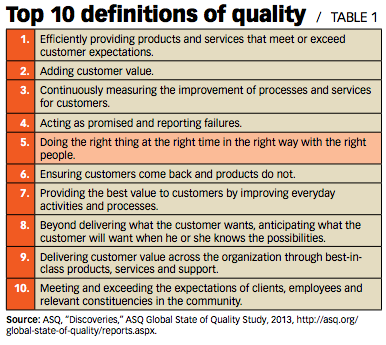I often ask potential hires “what is quality?” and it seems even people who’ve been in the quality assurance industry for 10 years don’t have a ready answer.
It seems like I am not the only one. Here are the most common responses gathered by the American Society for Quality during a recent survey:
I guess one could argue that there are several definitions, depending how high up in the sky we choose to be:
- At the micro level: “meeting the customer’s specifications”
- In a slightly less narrow view: “fitness for use” combined with “never stopping to improve processes”
- In terms an accountant understands: “ensuring customers come back and products do not”
- On a more macro level: “doing the right things in the right way through the practice of excellence”
Unfortunately, most Chinese companies are still at the micro level. Producing a quality product means complying with rules imposed by a customer. With that mindset, higher quality means extra inspectors, who cost more money.
I wrote about this in Is it expensive to increase the quality level in a factory?:
Importers use statistical quality control standards based on AQL limits. If a buyer sets a tolerance tighter than what is usually considered “normal” for general consumer goods, the supplier generally raises prices.
What is wrong with this mindset? It is 100% reactive, 0% proactive. There is no initiative to improve design & production processes.
Maybe some readers can propose a definition of quality that everyone can agree on?

